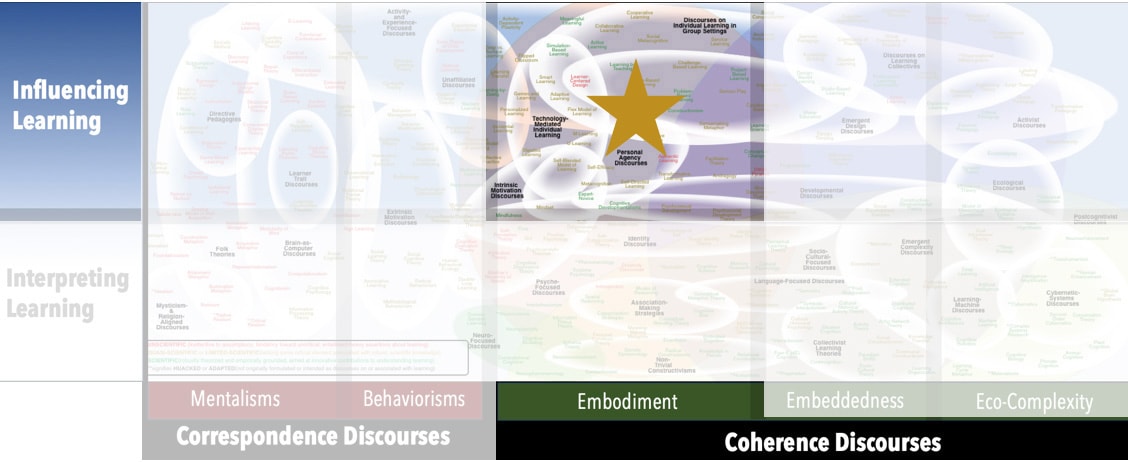AKA
Customized Learning
Individualized Learning
Personal Learning Environment
Focus
Self-directed supplementation of school-based learningPrincipal Metaphors
Personalized Learning is not explicit about or aligned with any theory of learning – and, consequently, direct references to learning are most often suggestive of Folk Theories.- Knowledge is … scope of possible actions and interpretations
- Knowing is … mastered material
- Learner is … an accumulator (individual)
- Learning is … acquiring
- Teaching is … supporting, facilitating
Originated
1960sSynopsis
Personalized Learning involves adjusting strategies, pace, content, aims, and feedback to fit the learner’s current needs – which entails considerations of both the individual and the situation. Ideally, such tailoring in not just for the learner, but also by the learner. That is, the individual should be involved in decisions. Typically (and increasingly), information and communication technologies play a role in Personalized Learning. Associated discourses include:- Cognitive Support – an umbrella term applied to any intervention or other form of assistance intended to mitigate issues with learning, cognition, and/or memory that might impede one’s routine obligations
- Individual Learning Plan (Individualized Learning Plan) – a learner-specific educational plan that is structured around the learner’s strengths and weaknesses, and that is oriented toward the learner’s long-term goals and career aspirations.
- Learning Pathway (Flexible Learning Pathway) (Philip Scott, 1990s) – founded on a Literalization (see Conceptual Metaphor Theory) of the Path-Following Metaphor, a type of interactive courseware in which learners are afforded choices of steps, tasks, etc. – that is, in controlling the paths they follow
Commentary
Criticisms of Personalized Learning tend to revolve around two main foci. Most prominently, Personalized Learning is associated with commercial interests – that is, it may be more about selling technological products than supporting individual growth. As well, many commentators voice concerns that connectivity and access are being conflated with deep and meaningful engagement. Most often, this concern is linked to observations that proponents of Personalized Learning rarely demonstrate awareness of socio-cultural and ecological issues or perspectives.Authors and/or Prominent Influences
DiffuseStatus as a Theory of Learning
Personalized Learning is not a theory of learning.Status as a Theory of Teaching
Personalized Learning is a theory of teaching – one in which pedagogical responsibilities are often seen as shared between humans and digital technologies.Status as a Scientific Theory
Through research associated with some of its near relatives, Personalized Learning can be said to be supported by some empirical evidence – especially around matters of attitude and engagement. However, its proponents do not appear to be at all attentive to the metaphors and other theoretical commitments that drive the discourse. As such, it cannot be described as a scientific theory.Subdiscourses:
- Cognitive Support
- Individual Learning Plan (Individualized Learning Plan)
- Learning Pathway (Flexible Learning Pathway)
Map Location

Please cite this article as:
Davis, B., & Francis, K. (2024). “Personalized Learning” in Discourses on Learning in Education. https://learningdiscourses.com.
⇦ Back to Map
⇦ Back to List
